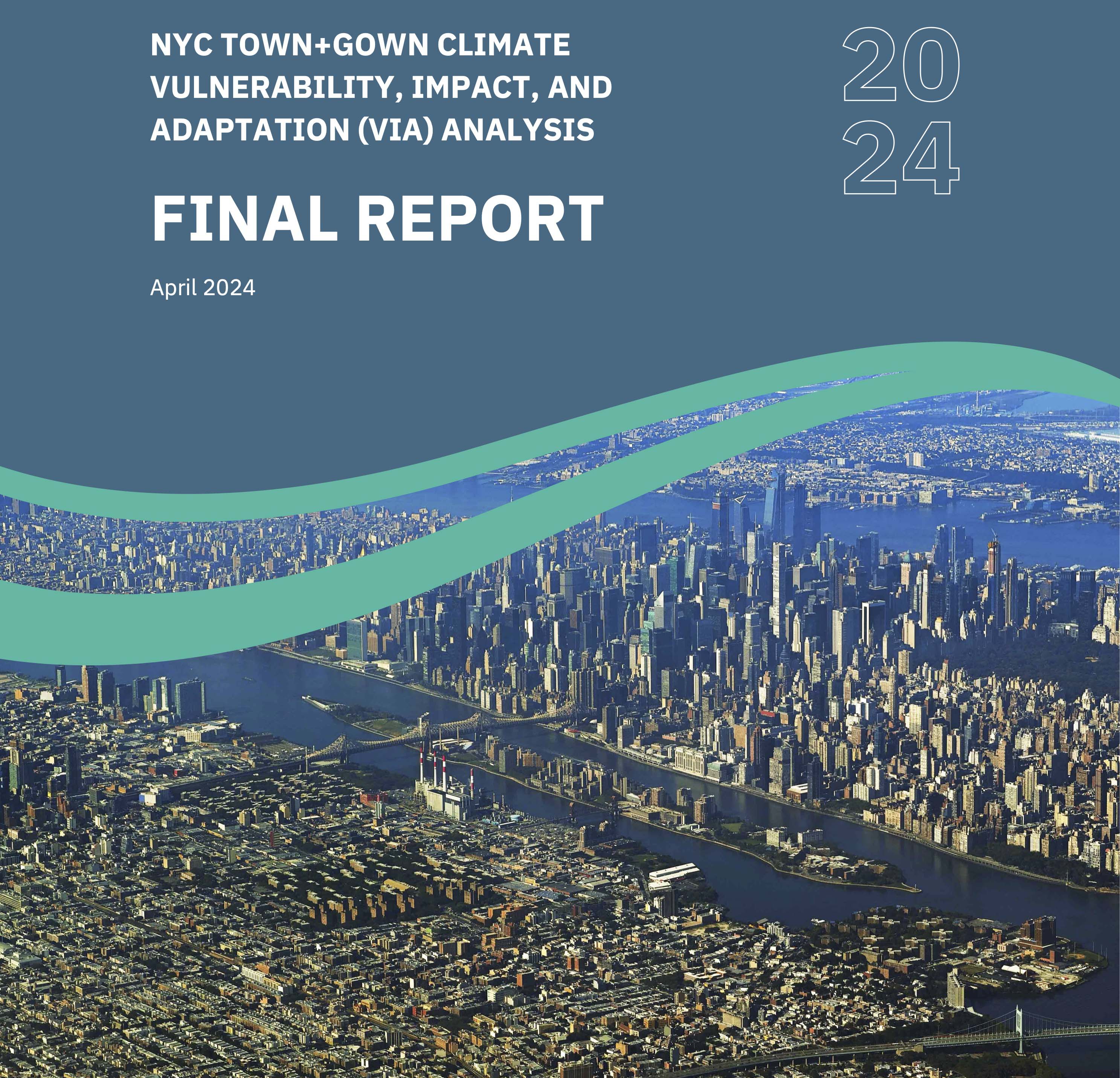How New York City Will Weather the Climate Storm: New Climate Report Explores Vulnerabilities and Resilient SolutionsA new study commissioned by the NYC Mayor’s Office of Climate & Environmental Justice presents key findings and recommendations for addressing future climate change impacts in New York City |
NEW YORK, April 15, 2024 – An 18-month study highlights the likelihood of increasing temperatures, rising sea levels, and more frequent extreme weather events in New York City and provides the city with critical information for prioritizing solutions. Conducted by an interdisciplinary team of researchers led by Professors Joel Towers and Dr. Timon McPhearson at The New School’s Tishman Environment and Design Center and Urban Systems Lab, the study was commissioned by the NYC Mayor’s Office of Climate & Environmental Justice (MOCEJ) through a Town+Gown partnership program. It explores how current and future climate change may pose substantial challenges to the city's infrastructure and communities, and provides critical insights that could advance solutions for adaptation and resiliency. The report includes four components examining the future of climate change for New York City including: climate change projections for the city, current and future extreme rainfall, a systematic assessment of health-related economic costs from climate-sensitive events, and a Flood Vulnerability Index (FVI) and flood impact assessment to drive forward equity-based decision-making on coastal flood resilience. The FVI is now available on MOCEJ’s EJNYC Mapping Tool. Key findings of the report highlight sea level rise projections by the end of the century, which may pose a threat to coastal communities and infrastructure. The study also reveals the complexity of flood risks and the importance of advanced flood modeling to examine the potential co-occurrence of rain and coastal storm surge impacts, especially during hurricanes. Other insights include the heightened threat posed by tropical cyclones, the importance of managing stormwater flooding triggered by extreme rainfall, and the substantial health-related economic costs attributed to climate-sensitive events including heat waves. However, the report also highlights the robust network of city agencies working toward equitable climate solutions, a model for how this work and studies going forward can be co-produced between researchers and the city, and the many ongoing initiatives undertaken over the past decade to advance the city’s sustainability and resiliency goals. Many of the key results and identified knowledge gaps are included in the assessment by the New York City Panel on Climate Change (NPCC) in its upcoming NPCC4 report. These observations provide critical actionable climate information while also suggesting a need to make improvements in how rainfall data is collected and analyzed and more standardized collection methods. The report also highlights the importance of tracking tropical storm activity and understanding how heavy rain combined with storm surges can lead to flooding. Additionally, the report underlines the importance of understanding the costs related to health issues caused by climate change. Investments such as better drainage systems, helping communities adapt equitably, and having early warning systems can help New Yorker’s prepare for and deal with the effects of climate change. The research team includes colleagues from Columbia University, Cornell University, City University of New York, Drexel University, Lamont Doherty Earth Observatory, NASA/GISS, Natural Resources Defense Council (NRDC), Population Council, Sarah Lawrence College, Science and Resilience Institute at Jamaica Bay (SRIJB), Stevens Institute of Technology, Arcadis, and USDA Forest Service, as well as input from NYC interagency collaborators. This research project highlights the value of, and a model for, scientific rigor that draws from the expertise of diverse institutions, individuals, and stakeholders to guide future responses to climate change impacts. The report stresses the need for ongoing research and collaboration, while also urging stakeholders to build on the study's findings to secure a resilient and sustainable future for New York City. To learn more about the report and research study, please join us for an in-person event at The New School’s Wollman Hall on Thursday, April 18, 2024 from 12:00 - 1:30 p.m. Members of the research team will be joined by Paul Lozito, Deputy Executive Director at MOCEJ, to discuss development of the study and how it will support future policy and action to advance climate adaptation in NYC. To register, visit: https://event.newschool.edu/equitablefuturesnyc. "The city has long relied on the latest available science of its world-leading academic partners as we respond to the impacts of climate change, and this study breaks down barriers between academia and government to produce a new model of collaborative, actionable science for NYC agencies. The findings in VIA underscore the importance of robust planning and resilience strategies to safeguard our communities and infrastructure." - Rohit T. Aggarwala, Chief Climate Officer and Commissioner, New York City Department of Environmental Protection "We work with leading climate scientists and researchers, like the authors of the VIA report, to ground our policy in the latest science on climate risks. Climate projections, environmental justice, and public health are connected, and New York City will continue to protect its residents from climate impacts and advance better health in our overburdened communities." - Elijah Hutchinson, Executive Director, Mayor's Office of Climate & Environmental Justice "The findings of this report underscore the value of interdisciplinary collaboration in addressing climate change in the NYC region. By bringing together expertise from academia, government, and the private sector, we can develop more holistic solutions that protect the city's residents, infrastructure, and ecology. This study sets a precedent for collaborative co-production that can guide future climate research and resilience efforts in NYC and elsewhere." - Dr. Timon McPhearson, The New School "The insights provided by this report are invaluable for informing climate adaptation strategies and for identifying ongoing research needs in New York City – from improving data quality to investing in climate-resilient infrastructure, the recommendations laid out in the study offer a roadmap for action. It is imperative that we leverage these findings to build a more resilient and equitable city for all." - Professor Joel Towers, The New School |
|
Founded in 1919, The New School was established to advance academic freedom, tolerance, and experimentation. A century later, The New School remains at the forefront of innovation in higher education, inspiring more than 10,000 undergraduate and graduate students to challenge the status quo in design and the social sciences, liberal arts, management, the arts, and media. The university welcomes thousands of adult learners annually for continuing education courses and public programs that encourage open discourse and social engagement. Through our online learning portals, research institutes, and international partnerships, The New School maintains a global presence. |
 |
MARKETING AND COMMUNICATION |
| 79 Fifth Avenue New York, NY 10003 www.newschool.edu |
PRESS RELEASE |
Media Contacts: Merrie Snead, Follow @TheNewSchool |
|
|
